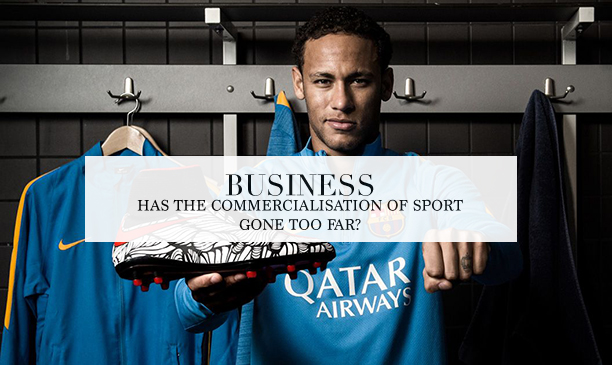The global sports market is estimated by Statista to be worth around $91billion. An incredible sum of money that with the advancement of technology and the continuous expansion of the global sports market, creating an influx of businesses wanting to be associated with sports. Due to this, the sports sponsorship market becomes more saturated by the day, with businesses and sporting entities trying to create new opportunities to generate revenue.
Here in lays the potential problem, with more businesses attempting to get in on the action, the saturation of the market increases the potential risk of over-commercialisation and the essence of sport being lost, with more focus being towards increasing profitability, rather than focusing on the integrity of sports or the satisfaction of customers. This is evident in the recent emergence within Football shirt sponsorships, with sponsor advertising space on the sleeves now being created; something which was unheard of until recently, especially within the Premier League.
Sponsorships deals range across a multitude of sporting entities, from mega deals with infrastructure like Arsenal Football Club’s Emirates stadium, to deals with athletes such as football superstar Cristiano Ronaldo or basketball star Lebron James, to teams like the New York Red Bulls; each sponsorship deal is worth millions. These deals are agreed to allow both parties to benefit, with the sponsored entity gaining financial or ‘in kind’ incentives, and the sponsor aiming to achieve market share growth, increased brand value or awareness and potential revenue from consumers purchasing their products because of the association with an entity.
Five potential opportunities for brands to gain from sponsorship:
- Increased brand awareness: Using a sports entities platform to promote the sponsor to potential consumers. As most of sport is televised, this platform gives the sponsor a vast reach.
- Brand image transfer: Like brand awareness, the sponsor will use the sporting entity as a platform to enhance its own reputation. This is often done with brands who have been viewed negatively, they attempt to change this perception through sponsorship of an entity with a positive reputation.
- Demonstration platform: Some sponsors use sporting properties to test new products or services to demonstrate and promote themselves at an event. A prime example of this is in Formula1, with manufacturers whom sponsor such entities will be able to showcase their products in extreme environments. Thus, enabling them to improve them constantly.
- Hospitality: This is utilised to establish long-term relationships, that are personal and face to face. This allows the creation of a social network of decision makers that is more relaxed and informal than a business meeting. This type of hospitality usually takes place within stadiums and executive suites. This opportunity is highly sought after by major corporate brands.
- Product trial/sales: Sponsors use product trials to distribute free samples at sporting events to instigate a positive perception and attitude towards the sponsor. In doing this, sponsors seek to generate loyalty and in turn, gain the exclusive right to sell their product within a sporting stadium. For example, Coca-Cola being the official beverage of the Olympics. Therefore, only their products can be sold in and around the Olympic villages and stadiums.
But now, sport can be overrun with commercial aspects, at every turn there is an advert for consumers to see, there is no escaping them. This can have a negative effect for both consumers and the sponsor, as consumers could become irritated by the constant marketing, or the message being communicated by the sponsor through their marketing, could be mixed up in the ‘noise’ of other sponsor’s communications.
As a business needs revenue to survive, sponsors are becoming more focused on the financial aspects of sponsorship, running the risk of losing customer focus and within sport, the customer is vital. Not only are they customers, but they become fans (considerably more loyal than your average customer). Therefore, if you lose their interest, there is no revenue to be made.
Four potential dangers of over-commercialising sport:
- Loss of fan equity: This sense of fan equity being lost has been touched upon in the earlier section of this article. This potential danger could lead to the loss of a long-term fanbase of a sporting entity because of the burden of increased costs is passed onto them through rising ticket and merchandise sales.
- Sponsor influence: A sponsor can have a major influence on sport, from tv broadcasters determining kick-off times, to athletes and teams being told to wear specific branded clothing. These changes or requests are pre-determined to make a sporting event more entertaining for media platforms or promote more of the sponsoring brand’s product.
- Changes in sport: Sponsorship can change a sport to benefit their own needs over the consumers. By inserting breaks into games like Tennis and cricket aswell as major events like the NFL Super Bowl (half-time show), sponsors aim to create more entertainment value to draw in consumers, however the over-promotion can turn them away.
- Negative associations with a sponsor: There is a predisposition that sports organisations are supposed to be socially responsible, with heavy investment in their corporate social responsibility, however, some sponsors can negatively affect the preconception of these sports organisations. Many of these cases are unintentional, with the reputation of gambling or alcoholic beverage sponsors adversely affecting a sporting entities reputation.
These potential dangers are very corporate based, with sponsors and sports organisations focusing on their profitability and seemingly less on their consumer’s interests. That isn’t to say that the consumers have been completely forgotten about, just that sport is a global industry, heavily reliant on profitability which can aim to benefit the future of a sport.
About The Author
 Luke is a Masters Degree Graduate in Sports Marketing from Coventry University, with a passion and interest in all things marketing; from sports to digital marketing. Honing in on his business acumen, the content he creates is in touch with current business trends. Follow Luke on LinkedIn.
Luke is a Masters Degree Graduate in Sports Marketing from Coventry University, with a passion and interest in all things marketing; from sports to digital marketing. Honing in on his business acumen, the content he creates is in touch with current business trends. Follow Luke on LinkedIn.

